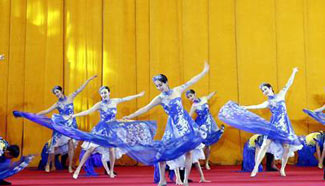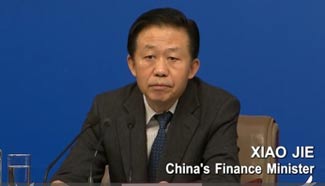BEIJING, March 7 (Xinhua) -- Journalists covering the annual sessions of China's national legislature and top political advisory body are attracted by some virtual reality (VR) and augmented reality (AR) products.
The products are on show at the ground floor of the hotel where the press center for the two sessions is located.
The exhibition was set up by China Today Net Television, whose executive director Wen Zhi hopes to transform video reporting into VR reporting.
"Chinese businesses may not have the technology of Western companies, but we can produce high-quality content," he said.
"It is obvious that journalists are willing to try different kinds of media including text, video, audio and live online. VR should be the next step," Wen said.
AR/VR industries are emerging in China. The eastern city of Nanchang launched a VR industrial base last year with an angel fund of 1 billion yuan (145 million U.S. dollars), and the VR firms will be supported by 10 billion yuan of investment.
City mayor Guo An, a national lawmaker, acknowledges that VR could change people's lives like the Internet and smartphone. "We have established a complete industrial chain with more than 50 enterprises and organizations."
To cultivate talent, the city cooperates with colleges and universities in training personnel. "We aim to train 10,000 people with basic VR knowledge and skill in the next three years."
China will work harder this year on innovation, upgrade the structure of the real economy and improve competitiveness, said the government work report delivered by Premier Li Keqiang at the legislature's annual session on Sunday.
To this end, China will push for technological innovation by improving support for fundamental and original research, building infrastructure for science and technology, setting up technological innovation hubs and sharing R&D resources, among other measures.
VR can be widely used in artificial intelligence, education and training, medicine, gaming, tourism and virtual communities.













